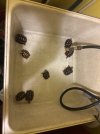Hortman81
New Member
So what are your credentials? Why are you right and I’m wrong?No, I won't be calling for your head, but I will tell you that is would be another terrible mistake and not good for the tortoises. Its bad enough stuffing adult CHs into small indoor enclosures over a frozen winter, there is no practical way to do this with tropical giants in your climate. The zoos do a miserable job of it, and it shows in their results.
Your tortoises are not different than other tortoises in this respect. They all need to eat and drink, they all need warmth, and they all share the same social biology.
You didn't anger me. I just think its sad for the animals when people don't understand these things and do things that are not good for the animals in their care. Its common for people to be upset and defensive when someone they don't even know tells them they are making a mistake that they don't even realize. That too is normal, typical behavior. I do it, everyone does it. But our goal here is to help people and their tortoises. We try to spread helpful info, experience based info, and prevent other people from falling into common pitfalls that we see over and over again. Another new member ignored this advice to separate her pair of cherry heads, insisting that her animals were fine and that the reputable breeder that sold them to her knew what he was talking about. Six weeks later she was back asking what to do because one had eaten the tail and back leg of the other. Some people have to learn the hard way. Some people never learn. I wish someone would have told me these things decades ago before I had to learn the hard way.
